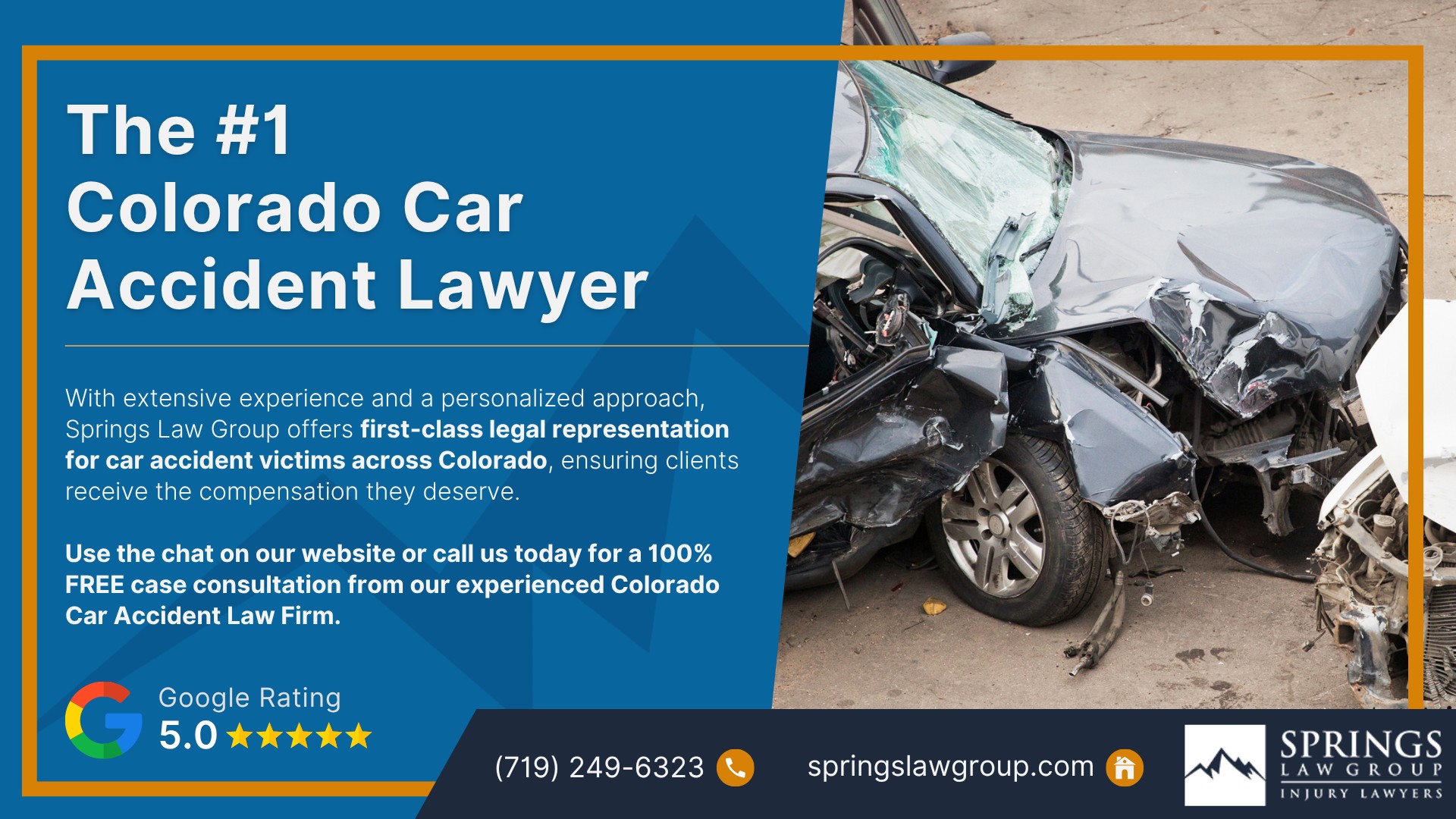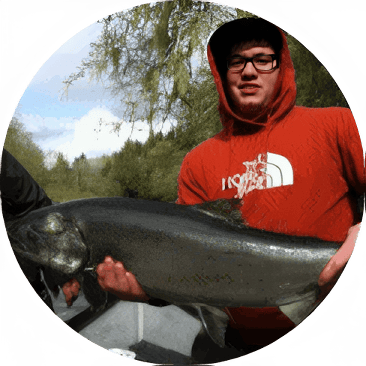
Member of the Colorado Bar Association since 2014. Attorney, Christopher M. Nicolaysen focuses primarily on helping those injured in Colorado car accidents, other auto accidents, and Colorado personal injury incidents.
This article has been written and reviewed for legal accuracy and clarity by the team of writers and attorneys at Springs Law Group and is as accurate as possible. This content should not be taken as legal advice from an attorney. If you would like to learn more about our owner and experienced Colorado personal injury lawyer, Christopher Nicolaysen, you can do so here.
Springs Law Group does everything possible to make sure the information in this article is up to date and accurate. If you need specific legal advice about your case, contact us. This article should not be taken as advice from an attorney.
The Colorado car accident injury claim process can feel overwhelming if you’re dealing with painful injuries, vehicle damage, and an uncooperative insurance company.
Knowing your legal rights and understanding how to pursue compensation is critical to recovering from an auto accident.
At Springs Law Group, we help accident victims take informed action and fight for the fair compensation they deserve.

Filing a car accident injury claim in Colorado can be overwhelming, especially when you’re recovering from severe injuries and facing mounting medical expenses.
In most car accident cases, the at-fault driver’s auto liability insurance is responsible for covering the damages, but getting a fair settlement isn’t always easy.
Insurance companies often work to minimize payouts, delay claims, or deny coverage altogether—especially when injuries are serious or costs exceed insurance policy limits.
If your damages go beyond what the insurance company is willing to pay, you may need to seek additional compensation through a personal injury lawsuit.
Understanding your rights and the steps in the process is key to protecting your financial responsibility and securing the support you need to recover.
Colorado law requires all drivers to carry auto accident liability coverage, but that doesn’t guarantee fair treatment after a crash.
Knowing how to properly document your claim, calculate losses, and respond to lowball offers can make all the difference.
This guide explains how the Colorado car accident injury claim process works, when to involve a lawyer, and how to pursue fair compensation under Colorado’s personal injury laws.
If you or a loved one has been injured in an auto accident caused by another driver, you may be entitled to fair compensation for your medical expenses, lost wages, and other damages
Contact Springs Law Group to learn how we can help you navigate the car accident injury claim process.
You can also use the chat feature on this page to find out if you qualify for a car accident claim instantly.
Colorado operates under an at-fault auto insurance system, meaning the insurance company, coverage the at-fault driver carries under their auto liability insurance, is responsible for paying your medical expenses, property damage, and other losses after a car crash.
In most cases, the at-fault driver’s insurer must compensate you for both economic and non-economic other losses, but insurers frequently undervalue claims or use legal defense tactics to minimize payouts.
Under Colorado’s modified comparative negligence rule, your total recovery is reduced by your percentage of fault, and if you’re 50% or more at fault, you receive nothing.
To counter insurance company strategies and reach a fair settlement, you’ll need solid insurance claims documentation that shows the full extent of your injuries and related damages.
This includes evidence such as police reports, witness statements, medical bills, and repair estimates.
An experienced attorney can help assemble this documentation, deal with insurers, and suggest the best course of action, whether negotiating a fair settlement or deciding to file a lawsuit.
If your injuries are severe or your insurance policy limits are insufficient, your lawyer may advise pursuing a personal injury lawsuit to obtain fair compensation, including coverage for emotional distress.
With Springs Law Group, you gain a partner who understands Colorado law and can help you stand up to insurer tactics from the outset.
Key elements of Colorado’s fault-based system:
With the right legal help, you can pursue justice through the system confidently.
The steps you take in the moments and days following a car crash can significantly affect your ability to seek compensation and protect your legal rights.
Colorado state law does not require you to handle everything alone, but what you do at the accident scene and shortly afterward can help or hurt your claim.
First, if you’re able, check for physical injuries and call 911 to report the crash.
Even if you feel okay, some injuries take time to appear and should be evaluated by a medical professional.
You should also exchange information with the other driver, take photos of the scene, and gather contact information from any witnesses.
While you’re required to notify your insurance company immediately, you’re not required to speak with insurance adjusters from the other party, especially not without legal advice.
Be cautious when giving any recorded statement, as insurers may use your words to downplay liability or damages.
If the crash involved a government entity (like a city vehicle or road maintenance crew) different rules and shorter deadlines may apply, making it even more important to speak with an attorney.
Steps to take after a car crash in Colorado:
These steps can help secure your claim and position you to pursue full compensation under Colorado’s fault-based system.
After a car accident in Colorado, the insurance claim process can be complicated, especially when injuries are serious or liability is disputed.
While many claims are resolved through negotiation, some require filing a lawsuit in civil court when the damages exceed insurance limits or when an insurance company refuses to pay damages fairly.
The steps outlined below apply to most car accident cases, but the exact course may vary depending on where the accident occurred, how clear fault is, and the injury severity involved.
An experienced law firm can help guide you through each stage, making sure deadlines are met, evidence is preserved, and your rights are protected throughout the process.
In some cases, when fault is heavily contested or serious injuries are involved, a lawsuit arises and may proceed to trial.
However, most cases are resolved through settlements or mediation before reaching that point.
If the case proceeds to trial and you win, the court may issue a court order requiring the at-fault party or their insurer to compensate you for your losses.
Here’s a step-by-step outline of the car accident injury claim process in Colorado:
Throughout this process, having an attorney helps make sure no step is missed and that your rights are fully enforced under Colorado law.
Gathering strong evidence is critical to proving liability and recovering compensation after a car accident.
The more documentation you have about the accident, your injuries, and the aftermath, the stronger your claim will be when negotiating with the insurance company or presenting your case in court.
Evidence should be collected as soon as possible after the crash, though an attorney can assist in tracking down missing documentation if you’re too injured to gather it yourself.
Properly documented evidence helps demonstrate fault, the severity of damages, and the full extent of your losses.
Common types of evidence in car accident claims include:
Recoverable damages in car accident claims refer to the financial and non-financial losses you may be entitled to after an accident caused by another party.
These damages help compensate you for the direct and indirect impact the accident has had on your life, from medical bills to emotional suffering.
The type and amount of compensation available depends on the severity of your injuries, the insurance coverage available, and how effectively your losses are documented.
An experienced car accident lawyer can assess your claim and pursue the full value of your damages under Colorado law.
Common recoverable damages in car accident claims include:
At Springs Law Group, we know how overwhelming the car accident claims process can feel—especially when you’re injured, stressed, and facing financial uncertainty.
Our team is here to guide you through every step, from filing your claim to negotiating with the insurance company and, if needed, pursuing justice in court.
With personalized attention and a proven track record of success, we work tirelessly to protect your rights and pursue the compensation you deserve.
Whether you’re dealing with severe injuries, denied coverage, or confusing paperwork, you don’t have to face it alone.
Contact us today to schedule a free consultation and find out how we can help you move forward.
You can also use the chat feature on this page to find out if you qualify for a Colorado car accident injury claim instantly.
Hiring a car accident lawyer in Colorado typically does not require any upfront payment because most personal injury attorneys work on a contingency fee basis.
This means legal fees are only collected if your attorney successfully recovers compensation for you through a settlement or verdict.
The benefit of this arrangement is that it allows injured clients to access quality legal representation without financial risk.
Your attorney’s payment is a percentage of your compensation, agreed upon in advance, so you’ll never pay out-of-pocket.
This structure keeps your lawyer motivated to pursue the maximum recovery for your case.
If the other driver’s insurance company denies your claim or attempts to minimize your payout, you still have legal options.
Insurance companies often try to limit liability to protect their bottom line, especially in cases involving serious injuries or extensive property damage.
A car accident lawyer can investigate the facts of your case, gather supporting evidence, and provide legal defense against false narratives or unjust denials.
With an experienced attorney on your side, you can challenge the insurer’s tactics and fight for the full compensation you’re entitled to under Colorado law.
When meeting with a car accident lawyer for the first time, it’s important to come prepared with documents and information that can help them evaluate your case.
Bringing the right materials allows your attorney to understand the accident’s circumstances, the injuries you’ve sustained, and how to move forward with your claim.
Items to bring include:
The more information you can provide upfront, the better equipped your lawyer will be to start building a strong claim on your behalf.
In Colorado, the statute of limitations for most car accident claims is three years from the date the accident occurred.
This means you have a three-year window to file a lawsuit against the at-fault driver for injuries or property damage.
If you fail to file within this period, your right to seek compensation through the civil court system may be lost.
There are exceptions, such as when a government entity is involved, which may shorten the deadline.
Speaking with an experienced attorney as soon as possible is the best way to protect your legal rights.

Partner
Attorney, Christopher M. Nicolaysen focuses primarily on helping those injured in car accidents due to no fault of their own.
The personal injury matters include auto accidents, bicycle accidents, pedestrian accidents, and trucking accidents.
Chris truly enjoys helping clients through a difficult time and helping them get the compensation they deserve.
We use reviews to help show more people like you why we do what we do!

I was uneasy about reaching out to a law firm after being in an accident that left me injured and my vehicle totaled. I don’t care for the idea of suing for what was very clearly an accident. However, after learning more about the overall process of working with a professional team to navigate the murky waters of the insurance world, I was pleasantly surprised to find that the experience wasn’t as gross as I’d originally felt about it.

Springs Law is very friendly and professional. I always felt that they were on my side and cared about my injury and what I was going through. I highly recommend them.

Springs Law Group is an amazing group to work with! I got into a rough accident, and they never ceased to let me know they were there working hard to help me in my hour of need. It was always very easy to reach out to someone if I had any questions, and they were always happy to answer any questions I had.

I never have a problem with getting a response when I need them – which is not the case with most other firms. They really truly care about each client. As a plus, they always have positive attitudes, which matters tremendously when you are in a stressful legal situation.

Big thanks to Mr. Jake Kimbell and his team for their assistance with my case. He helped me through an incredibly challenging part of my life, and most importantly helped navigate through the convoluted legal channels of my case. I cannot thank him and his team enough for their support.

The entire team at Springs Law group has been nothing but amazing. Jake and the rest of the staff were great to work with and extremely professional. They were very attentive and answered any questions and concerns I had. I was always able to contact them and they were very responsive and communicated with me.

Springs Law Group is an amazing group to work with! I got into a rough accident, and they never ceased to let me know they were there working hard to help me in my hour of need. It was always very easy to reach out to someone if I had any questions, and they were always happy to answer any questions I had.





